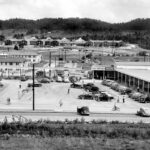KNOXVILLE—Most people have experienced a long wait to see a doctor. Technology being developed through a new collaboration between the University of Tennessee in Knoxville, Y-12 National Security Complex, and Stanley Healthcare aims to cut down on wait times.
The three entities are developing an intelligent interactive dashboard that crunches data in real time to help managers determine how best to administer flow.
An official signing of a cooperative research and development agreement was signed during the Tennessee Valley Corridor’s National Technology Summit on Wednesday evening at the Y-12 National Security Complex’s New Hope Center in Oak Ridge.
The agreement helps to fast-track commercialization of the technology being developed within the labs of UT’s Department of Industrial and Systems Engineering, Y-12, and Stanley Healthcare, through the sharing of expertise.
“By putting our heads together, we are advancing technology and knowledge faster while giving our students invaluable learning opportunities,” said Taylor Eighmy, UT’s vice chancellor for research and development. “One of the truly interesting things about this group’s approach is that it is applicable to a wide variety of settings, so it can be used to increase efficiency in manufacturing, maintenance or the service industry. UT is in the process of developing similar agreements with organizations nationwide.”
While it has general applications, the dashboard—like that found in a car—is being tested in Y-12’s health clinic with the promise of saving 8,000 hours of patient waiting time and more than $1 million through its decision-making, predictive modeling, and optimization techniques, which provide managers with a solution set to help them make decisions more effectively.
“The challenge facing managers is being provided too much data and not being able to process this data,” said Tom Berg, project manager at Y-12. “This agreement focuses on advancing technologies which can be used at Y-12 and anywhere. The ultimate goal is to provide the manager with an easy-to-use dashboard that integrates data from multiple sources and presents it in an easy-to-understand format.”
The dashboard will measure the impact of changes, such as a nurse calling in sick or a machine going down, and will provide a set of alternatives for the manager to deal with the situation.
“There will be a management system that automatically collects data from different sources, processes it and determines a workplace’s current operation, optimizes operations given current resources, forecasts outcomes, and performs given scenarios as conditions change,” said Xueping Li, associate professor of industrial engineering.
The approaches and technology used in building this system will be applied to a variety of other applications ranging from production operations to business systems.
Three industrial engineering graduate assistants; two MBA graduate assistants; and engineering professors Rupy Sawhney, Jim Ostrowski, and Li are working with teams at Y-12 and Stanley Healthcare.
“I really enjoy seeing a series of techniques taught in the classroom applied to the real world and how that’s different from the classroom setting,” said Colby Mattie, an MBA graduate assistant. “There’s far more to these analyses than just performing them. There are all the organizational hurdles, with the ability to take something this complex and putting it in simple terms being just as important as the actual analysis.”
Stanley Healthcare is market leading provider of safety, security and operational efficiency solutions for the healthcare industry. It provides more than 5,000 acute care hospitals and 12,000 long-term care organizations with enterprise solutions. Stanley Healthcare is a part of Stanley Black & Decker Inc. For more information, visit http://www.StanleyHealthcare.com.










Leave a Reply